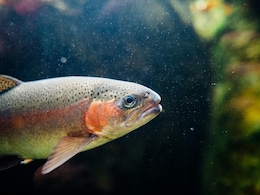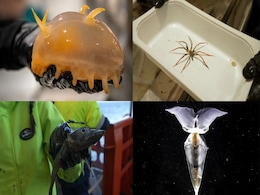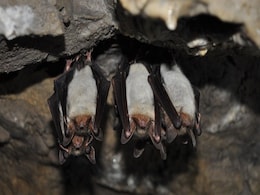Study Of Animation
- All
- News
-

Father's Exposure To Microplastics May Increase Metabolic Dysfunction And Diabetes Risk In Daughters, Finds Study
- Saturday December 27, 2025
- Health | Indo-Asian News Service
A fathers exposure to microplastics can trigger metabolic dysfunctions in children, with daughters more at risk of developing diabetes, according to animal studies.
-
 www.ndtv.com
www.ndtv.com
-

"Trash Panda" 2: Raccoon Who Burgled Liquor Store Now Strikes Karate Studio For Snacks
- Saturday December 13, 2025
- World News | Edited by Anushree Jonko
A raccoon that broke into a liquor store in the US and passed out after getting drunk last month has again caused chaos.
-
 www.ndtv.com
www.ndtv.com
-

Ancient Fossils Show Animals Used Earth's Magnetic Field For GPS-Like Navigation
- Sunday November 30, 2025
- Science | Edited by Astitva Raj
They observed that the structure of tiny magnetic fields generated by the rotating electrons indicates that the organisms that created these fossils possessed magnetoreception.
-
 www.ndtv.com
www.ndtv.com
-

Dark Chocolate, Berries May Help Boost Memory And Relieve Stress: Study
- Sunday November 2, 2025
- Health | Indo-Asian News Service
Struggling with memory and stress issues? A bite of dark chocolate or a handful of berries may help boost your memory levels and also cut down stress, according to an animal study.
-
 www.ndtv.com
www.ndtv.com
-

One Of The World's Rarest Whales Grows In Population In The Atlantic
- Tuesday October 21, 2025
- World News | Associated Press
One of the rarest whales on the planet has continued an encouraging trend of population growth in the wake of new efforts to protect the giant animals, according to scientists who study them.
-
 www.ndtv.com
www.ndtv.com
-

When Primatologist Jane Goodall Compared Trump To Male Chimpanzees
- Thursday October 2, 2025
- World News | NDTV News Desk
British chimpanzee expert, Jane Goodall, died on Wednesday at the age of 91. Today, a day later, one of her old interviews, in which the famed primatologist compared US President Donald Trump to her beloved animal, chimpanzees, has resurfaced.
-
 www.ndtv.com
www.ndtv.com
-

Whales And Dolphins Frequently Hang Out With Each Other: Study
- Tuesday August 12, 2025
- Feature | The Conversation
As the annual humpback whale migration is underway with thousands of whales passing by the Australian coast, there are reports of dolphins joining the mass movement.
-
 www.ndtv.com
www.ndtv.com
-

5 Arms, No Eyes, No Heart: DNA Revealed Weird Deep-Sea Brittle Star Journey
- Thursday July 24, 2025
- World News | Tim O'Hara, The Conversation
You may have read that the deep sea is a very different environment from the land and shallow water. There is no light, it is very cold, and the pressure of all the water above is immense.
-
 www.ndtv.com
www.ndtv.com
-

Insects Listen When Plants Talk, Finds Israeli Study
- Wednesday July 16, 2025
- Science | Reuters
There is evidence that plants and insects interact through sound, researchers at Tel Aviv University said on Tuesday, opening a new frontier in the study of acoustic communication in nature
-
 www.ndtv.com
www.ndtv.com
-

Extreme Heat Could Raise Death Risk For Pet Dogs By 10%, Warns Study
- Tuesday July 8, 2025
- Science | Edited by Nikhil Pandey
A new study led by UNSW Sydney warns that extreme heat significantly increases the risk of death in pet dogs, raising fresh concerns about the impact of climate change on animals.
-
 www.ndtv.com
www.ndtv.com
-

Cuttlefish May Communicate Using Tentacle Waves, Study Finds
- Friday May 9, 2025
- Written by Gadgets 360 Staff
Cuttlefish are known to use more than color-changing and posture to communicate — new research suggests they wave their tentacles to send signals. Scientists at École Normale Supérieure observed four distinct wave patterns and found cuttlefish respond both visually and through water vibrations. With plans to use AI and robotics to decode these ...
-
 www.gadgets360.com
www.gadgets360.com
-

Scientists Reportedly Discover New Species of Marine Life on the Antarctic Ocean Floor
- Thursday April 17, 2025
- Written by Gadgets 360 Staff
Strange underwater life ranging from hand-sized sea spiders to jelly-like sea pigs to a breeding sea butterfly has been found by Australian scientists investigating the Antarctic ocean floor. Taken aboard the RSV Nuyina icebreaker, these unusual species found at enormous depths provide understanding of life in one of the toughest places on Earth. S...
-
 www.gadgets360.com
www.gadgets360.com
-

1 Trillion Species, 3 Billion Years: AI Helped Trace Bacteria Evolution On Earth
- Friday April 4, 2025
- World News | The Conversation
Bacteria consist of a single cell. They do not have bones and are not like big animals that leave clear signs in the geological record, which thankful palaeontologists can study many millions of years later.
-
 www.ndtv.com
www.ndtv.com
-

Bats Avoid Mid-Air Crashes by Adjusting Their Echolocation During Flight
- Friday April 4, 2025
- Written by Gadgets 360 Staff
A recent study conducted in Israel’s Hula Valley reveals how bats manage to avoid collisions while exiting caves in large groups. Despite the expected interference from their echolocation calls, which could lead to crashes, bats have adapted by making behavioural changes. They fan out in flight, switching to higher-frequency calls that are shorte...
-
 www.gadgets360.com
www.gadgets360.com
-

Father's Exposure To Microplastics May Increase Metabolic Dysfunction And Diabetes Risk In Daughters, Finds Study
- Saturday December 27, 2025
- Health | Indo-Asian News Service
A fathers exposure to microplastics can trigger metabolic dysfunctions in children, with daughters more at risk of developing diabetes, according to animal studies.
-
 www.ndtv.com
www.ndtv.com
-

"Trash Panda" 2: Raccoon Who Burgled Liquor Store Now Strikes Karate Studio For Snacks
- Saturday December 13, 2025
- World News | Edited by Anushree Jonko
A raccoon that broke into a liquor store in the US and passed out after getting drunk last month has again caused chaos.
-
 www.ndtv.com
www.ndtv.com
-

Ancient Fossils Show Animals Used Earth's Magnetic Field For GPS-Like Navigation
- Sunday November 30, 2025
- Science | Edited by Astitva Raj
They observed that the structure of tiny magnetic fields generated by the rotating electrons indicates that the organisms that created these fossils possessed magnetoreception.
-
 www.ndtv.com
www.ndtv.com
-

Dark Chocolate, Berries May Help Boost Memory And Relieve Stress: Study
- Sunday November 2, 2025
- Health | Indo-Asian News Service
Struggling with memory and stress issues? A bite of dark chocolate or a handful of berries may help boost your memory levels and also cut down stress, according to an animal study.
-
 www.ndtv.com
www.ndtv.com
-

One Of The World's Rarest Whales Grows In Population In The Atlantic
- Tuesday October 21, 2025
- World News | Associated Press
One of the rarest whales on the planet has continued an encouraging trend of population growth in the wake of new efforts to protect the giant animals, according to scientists who study them.
-
 www.ndtv.com
www.ndtv.com
-

When Primatologist Jane Goodall Compared Trump To Male Chimpanzees
- Thursday October 2, 2025
- World News | NDTV News Desk
British chimpanzee expert, Jane Goodall, died on Wednesday at the age of 91. Today, a day later, one of her old interviews, in which the famed primatologist compared US President Donald Trump to her beloved animal, chimpanzees, has resurfaced.
-
 www.ndtv.com
www.ndtv.com
-

Whales And Dolphins Frequently Hang Out With Each Other: Study
- Tuesday August 12, 2025
- Feature | The Conversation
As the annual humpback whale migration is underway with thousands of whales passing by the Australian coast, there are reports of dolphins joining the mass movement.
-
 www.ndtv.com
www.ndtv.com
-

5 Arms, No Eyes, No Heart: DNA Revealed Weird Deep-Sea Brittle Star Journey
- Thursday July 24, 2025
- World News | Tim O'Hara, The Conversation
You may have read that the deep sea is a very different environment from the land and shallow water. There is no light, it is very cold, and the pressure of all the water above is immense.
-
 www.ndtv.com
www.ndtv.com
-

Insects Listen When Plants Talk, Finds Israeli Study
- Wednesday July 16, 2025
- Science | Reuters
There is evidence that plants and insects interact through sound, researchers at Tel Aviv University said on Tuesday, opening a new frontier in the study of acoustic communication in nature
-
 www.ndtv.com
www.ndtv.com
-

Extreme Heat Could Raise Death Risk For Pet Dogs By 10%, Warns Study
- Tuesday July 8, 2025
- Science | Edited by Nikhil Pandey
A new study led by UNSW Sydney warns that extreme heat significantly increases the risk of death in pet dogs, raising fresh concerns about the impact of climate change on animals.
-
 www.ndtv.com
www.ndtv.com
-

Cuttlefish May Communicate Using Tentacle Waves, Study Finds
- Friday May 9, 2025
- Written by Gadgets 360 Staff
Cuttlefish are known to use more than color-changing and posture to communicate — new research suggests they wave their tentacles to send signals. Scientists at École Normale Supérieure observed four distinct wave patterns and found cuttlefish respond both visually and through water vibrations. With plans to use AI and robotics to decode these ...
-
 www.gadgets360.com
www.gadgets360.com
-

Scientists Reportedly Discover New Species of Marine Life on the Antarctic Ocean Floor
- Thursday April 17, 2025
- Written by Gadgets 360 Staff
Strange underwater life ranging from hand-sized sea spiders to jelly-like sea pigs to a breeding sea butterfly has been found by Australian scientists investigating the Antarctic ocean floor. Taken aboard the RSV Nuyina icebreaker, these unusual species found at enormous depths provide understanding of life in one of the toughest places on Earth. S...
-
 www.gadgets360.com
www.gadgets360.com
-

1 Trillion Species, 3 Billion Years: AI Helped Trace Bacteria Evolution On Earth
- Friday April 4, 2025
- World News | The Conversation
Bacteria consist of a single cell. They do not have bones and are not like big animals that leave clear signs in the geological record, which thankful palaeontologists can study many millions of years later.
-
 www.ndtv.com
www.ndtv.com
-

Bats Avoid Mid-Air Crashes by Adjusting Their Echolocation During Flight
- Friday April 4, 2025
- Written by Gadgets 360 Staff
A recent study conducted in Israel’s Hula Valley reveals how bats manage to avoid collisions while exiting caves in large groups. Despite the expected interference from their echolocation calls, which could lead to crashes, bats have adapted by making behavioural changes. They fan out in flight, switching to higher-frequency calls that are shorte...
-
 www.gadgets360.com
www.gadgets360.com
















